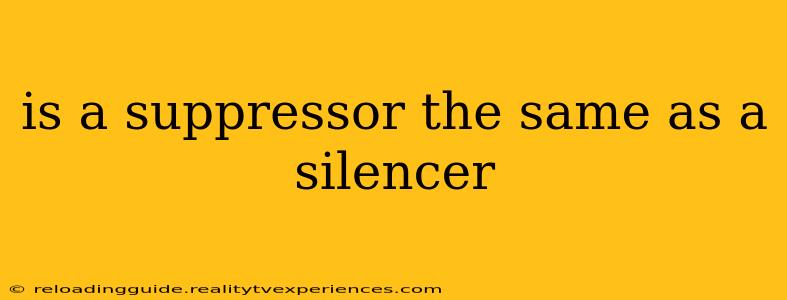The terms "suppressor" and "silencer" are often used interchangeably, leading to confusion. While they both refer to devices that reduce the sound of a firearm, there's a subtle but important distinction. Understanding this difference is crucial for anyone interested in firearms, their regulations, and responsible gun ownership.
The Technical Difference: Suppressing, Not Silencing
The key lies in the effect these devices have on gunshot sound. A suppressor doesn't eliminate the sound entirely; instead, it suppresses or significantly reduces it. The sound is still present, just at a much lower decibel level. The term "silencer," on the other hand, is a misnomer. It implies complete silence, which is not achievable with current technology.
Think of it like this: a suppressor is more akin to a muffler on a car. It doesn't make the car completely silent, but it drastically reduces the noise.
Why the Misunderstanding Persists?
The term "silencer" has been popularized through decades of media portrayals, often in movies and television shows. These portrayals consistently depict suppressors as rendering firearms completely silent, which is far from reality. This inaccuracy has contributed significantly to the common misunderstanding.
The Legal Implications: Suppressors and the Law
The terminology used in legal contexts surrounding firearms and suppressors is crucial. While the terms may be used interchangeably in casual conversation, official documentation and legal proceedings typically utilize the term "suppressor." This reflects the accurate description of the device's function. The legal implications of owning and using a suppressor vary significantly depending on jurisdiction, making precise language vital.
How Suppressors Work: The Science Behind Sound Reduction
Suppressors work by slowing and expanding the gases produced by a firearm's discharge. They achieve this through a series of baffles and chambers within the device. This expansion reduces the velocity and pressure of the gases, thus lessening the intensity of the sound produced. However, the inherent mechanics of a firearm's operation always result in some sound.
Factors Affecting Sound Reduction:
Several factors influence the effectiveness of a suppressor:
- Caliber of the firearm: Larger calibers generally produce more noise, making suppression more challenging.
- Suppressor design: Different designs offer varying levels of sound reduction.
- Ammunition type: The type of ammunition used also affects the sound produced.
The Responsible Use of Suppressors: Safety and Hearing Protection
Even with a suppressor, hearing protection is still recommended. While suppressors significantly reduce the noise, the sound produced is still potentially harmful to hearing if exposed for extended periods. Responsible gun owners prioritize hearing safety and always employ appropriate hearing protection when using firearms, even with a suppressor attached.
Conclusion: Accuracy in Terminology Matters
In conclusion, while the terms "suppressor" and "silencer" are often used interchangeably, understanding the nuances is crucial. A suppressor reduces the sound of a firearm, but doesn't render it completely silent. The term "silencer" is a misnomer and can contribute to misconceptions about their functionality and legal implications. Using the correct terminology, particularly in legal or official contexts, ensures clarity and accuracy. Always prioritize responsible gun ownership, including the proper use of hearing protection, regardless of whether a suppressor is used.

